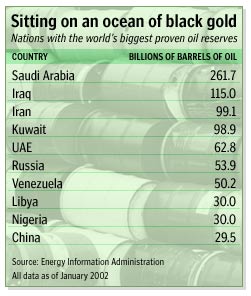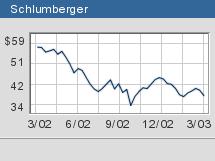NEW YORK (CNN/Money) -
Rebuilding Iraq, especially its rich oil fields, will be a multi-billion dollar job, some of which will be handled by public companies including Dick Cheney's old employer, Halliburton Co. But it's far from clear that building the peace will provide a windfall for investors.
| 
| |

| 
| 
|

|
 President Bush to present Congressional leaders with budget of about $75B to cover war costs. President Bush to present Congressional leaders with budget of about $75B to cover war costs.
|
|
Play video
(QuickTime, Real or Windows Media)
|
| 
|

|
|
Key to the rebuilding -- which could cost $25 billion to $100 billion, according to some estimates -- will be oil, Iraq's life blood. It's just about the only thing the country exports, and funds from oil exports are used to buy almost everything Iraqis need, including food, clothing and medicine.
But Iraq's oil fields have seriously degenerated since the years of its devastating 1980-88 war with Iran, due mainly to a lack of modern equipment, industry experts say. Extracting enough oil to rebuild the country -- or even to keep Iraqis from starving -- will take a lot of prep work.

"After two major wars and a decade of sanctions, Iraq's oil industry is in desperate need of repair and investment," said a recent study by the James A. Baker III Institute for Public Policy at Rice University, named for the first President Bush's Secretary of State during the first Gulf War.
Who cuts up the pie?
Simply getting Iraq's oil fields back to their pre-1991 production of about 3.5 million barrels a day will take at least 18 months and cost about $5 billion initially, with another $3 billion in annual operating expenses, according to the Baker Institute study.
If the U.S. government is handing out the contracts for this job, the biggest beneficiaries, according to Banc of America Securities energy analyst Jim Wicklund, would be Dallas-based Halliburton (HAL: Research, Estimates), Baker Hughes Inc. (BHI: Research, Estimates), Weatherford International Inc. (WFT: Research, Estimates) and Schlumberger Ltd. (SLB: Research, Estimates) -- in that order. All of them are oilfield service companies with the expertise to rebuild Iraq's fields.

But the U.S. government might not have the authority to give those contracts out. And awarding one to Halliburton -- probably the most qualified company, according to industry experts -- could subject the Bush administration to political sniping, given Vice President Cheney's history of involvement with the company, an ongoing Securities and Exchange Commission investigation into its accounting and questions about its involvement with Iran, a nation the U.S. has accused of sponsoring terrorism.
Instead, the United Nations, which runs the program under which Iraqi oil is sold for food for the Iraqi people, could get the authority to take bids and might look beyond the United States for bidders.
Yet that also could spark a political backlash in the United States. Imagine how the "freedom fries" set would react if the rebuilding job goes to a French oil company such as TotalFinaElf S.A. (TOT: Research, Estimates)
For now, though, this political hot potato is still up in the air. The U.N. says it needs a Security Council resolution to start soliciting bids for rebuilding Iraq, and the sharply divided Security Council may not approve one.
| Related stories
|

|
|
|
|
Meanwhile, the State Department's U.S. Agency for International Development (USAID), which is handling much of Iraq's reconstruction, already has solicited bids for eight contracts for a variety of tasks, such as repairing roads, bridges, hospitals, water and sanitation systems and more.
Oil field repair was not on the list, and the agency would not speculate about whether it will be.
"This is by no means an inclusive list, but how far beyond that we're going to go, I'm not sure yet," USAID spokesman Luke Zahner said.
The pipe dream: Iraq astride the oil industry
Halliburton and other oifield services companies also could win big from another, pipe-dream scenario that involves beefing up Iraq's capacity to fully exploit its vast reserves of oil underground, which total at least 110 billion barrels, the second-largest proven reserve in the world.
"With the right investment environment and under the right government, Iraq could increase production by a million barrels a day every year for the next 10 years," said Fadel Gheit, oil analyst at Fahnestock & Co. "It could be the largest oil exporter in the world, eclipsing Saudi Arabia."

That investment, Gheit said, could be $10 billion a year for the next 10 years. While that sounds like a bonanza for companies like Halliburton and other oilfield services firms, industry analysts warn that exploration in Iraq could merely shift resources from other parts of the world.
In other words, Halliburton will be building oil wells one way or the other, and tapping Iraq's ocean of oil won't do much for its revenue growth.
"If I'm Exxon Mobil (XOM: Research, Estimates) and I have a budget and Iraq opens up, I'm not going to increase spending -- I'm just going to rearrange my priorities," Gheit said. "I might like all the dishes on the table, but I only have one stomach, so I'm not going to eat all of them."
Smaller jobs
Halliburton reportedly has bid for the biggest current USAID contract, worth up to $600 million, to rebuild Iraq's infrastructure after the war.
Competing for the job, according to recent reports by the Wall Street Journal and New York Times, are Bechtel Group Inc., Parsons Corp., Washington Group International Inc. (WGII: Research, Estimates) and a team of Louis Berger Group and Fluor Corp. (FLR: Research, Estimates)
Neither Halliburton nor the USAID would confirm that Halliburton is bidding on the job, which could be awarded this week. Even if Halliburton wins, however, the $600 million value of the contract is not a hard figure, but a ceiling for the value of the work.

And that income would be spread across 21 months of work -- an average of about $28.6 million a month, or $86 million per quarter -- less than 3 percent of Halliburton's total revenue in the fourth quarter of 2002.
More work, billions of dollars' worth, will be needed after these preliminary jobs are awarded. But those bids might not be taken until a new Iraqi government is in place.
Before the war, much attention was focused on the possibility that Iraqi troops would set oil fields afire, as they did to Kuwaiti oil fields in the first Gulf War.
But very few Iraqi oil fields have been sabotaged, and many have been secured by U.S.-led forces. What's more, fighting the fires would be a one-off job that likely would do little good for Halliburton or other firefighting companies, such as Boots & Coots (WEL: Research, Estimates) and RPC Inc. (RES: Research, Estimates), in the long run.
"The market doesn't give these companies much credit because it's a non-recurring event," said Wicklund of Banc of America.

|

